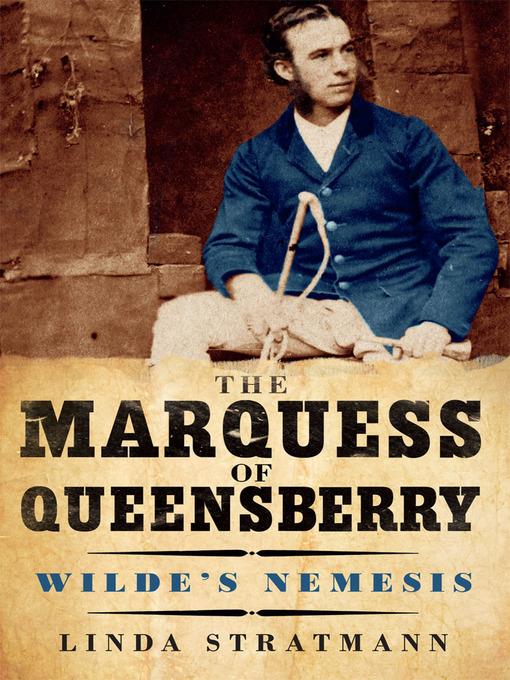
The Marquess of Queensberry
Wilde's Nemesis
- اطلاعات
- نقد و بررسی
- دیدگاه کاربران
نقد و بررسی

May 1, 2013
A straightforward attempt to rehabilitate Oscar Wilde's tormentor as a family man. British author and crime novelist Stratmann (Greater London Murders, 2010, etc.) certainly fleshes out this highly vilified character and father to Lord Alfred Douglas, aka Bosie, Wilde's lover. Indeed, much of what we know about the ninth Marquess of Queensberry has been learned from his contradictory and "self-justifying" son or other unreliable sources. Was Queensberry's vindictive pursuit of Wilde an understandable expression of paternal protectiveness, or was it an outgrowth of an insidious genetic instability that can be traced to a mad distant cousin? The Queensberry inheritance meant that, at age 14, with the sudden death of his father, the eldest son was set to inherit enormous wealth and vast land in Scotland and England. Queensberry became a naval cadet whose passions, as they had been for his father, were sports and gambling. Yet another trauma occurred at age 21, when he received news that his beloved brother had died in a climbing accident; shortly after, Queensberry married the beautiful Sibyl Montgomery, and though the match yielded children, the parents were disastrously incompatible. Strong-willed to the point of being obsessive, a freethinker ostracized by his peers in Parliament for his outspoken embrace of agnosticism and regarded as somewhat of a crackpot, Queensberry became alarmed at the company kept by his spoiled, imperious third son, Bosie, namely his "unusual friendship" with the notorious Wilde. Indeed, the author deems Bosie a rather worse influence on the elder poet, a lethal mixture of both his parents, who introduced Wilde to the low-class youths that would bring about his downfall. While formal and academic, this portrait presents compelling new evidence of Queensberry's humanity.
COPYRIGHT(2013) Kirkus Reviews, ALL RIGHTS RESERVED.

June 1, 2013
History remembers the ninth Marquess of Queensberry as a mad crank and Oscar Wilde (1854-1900) as a martyr. Popular historian and mystery author Stratmann ("Frances Doughty Mysteries") sets out to restore the reputation of the Scottish peer and sportsman, known as "Q," who played a role in creating the rules that tamed boxing. Embittered by a miserable marriage, John Sholto Douglas (1844-1900) became a public crusader against Christianity and marriage. When Wilde took up with Douglas's son Alfred ("Bosie"), two men who believed the conventions of society did not apply to them confronted each other. Wilde, at the height of his career as a playwright, the toast of the West End, recklessly sued the father for describing him as "posing as a somdomite [sic]." The proceedings led to Wilde's sentence to hard labor for "gross indecency." Neither man recovered from the scandal. VERDICT This prolonged look at the unappealing and combative Douglas does nothing to overturn the traditional view. The book would have benefited from a "life and times" approach, particularly in the area of homosexuality, since few people then really understood what a "somdomite" did. (Q himself had learned much having come of age in the navy.) This book is only for committed Wildeans.--Stewart Desmond, New York
Copyright 2013 Library Journal, LLC Used with permission.

Starred review from June 1, 2013
Considered the catalyst of Oscar Wilde's downfall, John Sholto Douglas, ninth marquess of Queensberry (18441900), has been stigmatized as mad, homophobic, and otherwise execrable. Historical true-crime and mystery writer Stratmann's enthralling biography questions such characterizations. Queensberry was quick to anger and a fight, but so were many other Douglases, before and since. He was vigorous in defense but not aggressive, which makes sense in view of his fame as a top amateur boxer, responsible for the rules that revived boxing as a sport and bear his name. He had advanced opinionsagnosticism, divorce reform, women's suffragethat he proclaimed boldly and unapologetically, and they, along with his dustups with offensive aristocrats and plebeians alike, were what led to his being called mad. Moreover, his life brimmed with woessuicides, accidental deaths, alcoholism, marital discord and divorce, alienation from his children, and their prodigalitywhich severely strained his emotional and financial resources. When his son Alfred's relationship with Wilde became a public scandal, he sought to end itthere were, after all, criminal consequences for homosexualityby personally preventing the two from meeting again. When Wilde retaliated and lost his case, it speaks for Douglas that he didn't press criminal charges against Wildethe crown did. Far from evil, Queensberry as Stratmann presents him is definitely sympathetic, perhaps even admirable.(Reprinted with permission of Booklist, copyright 2013, American Library Association.)




دیدگاه کاربران